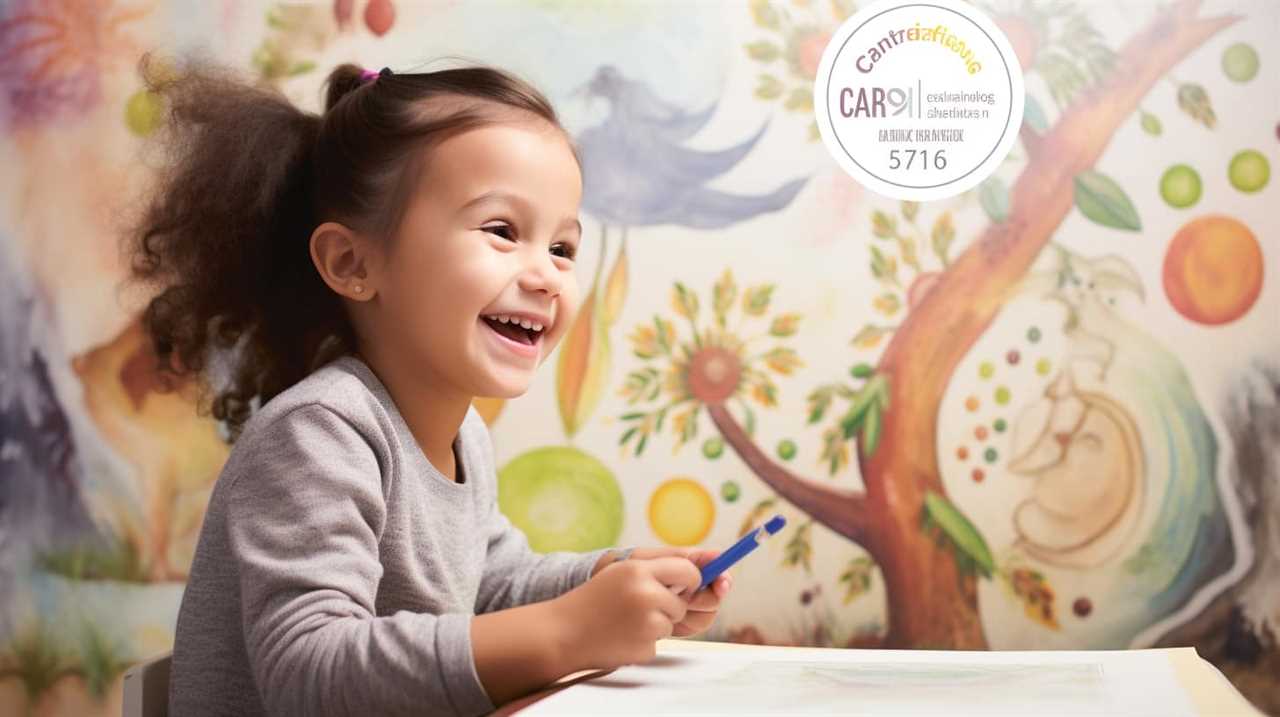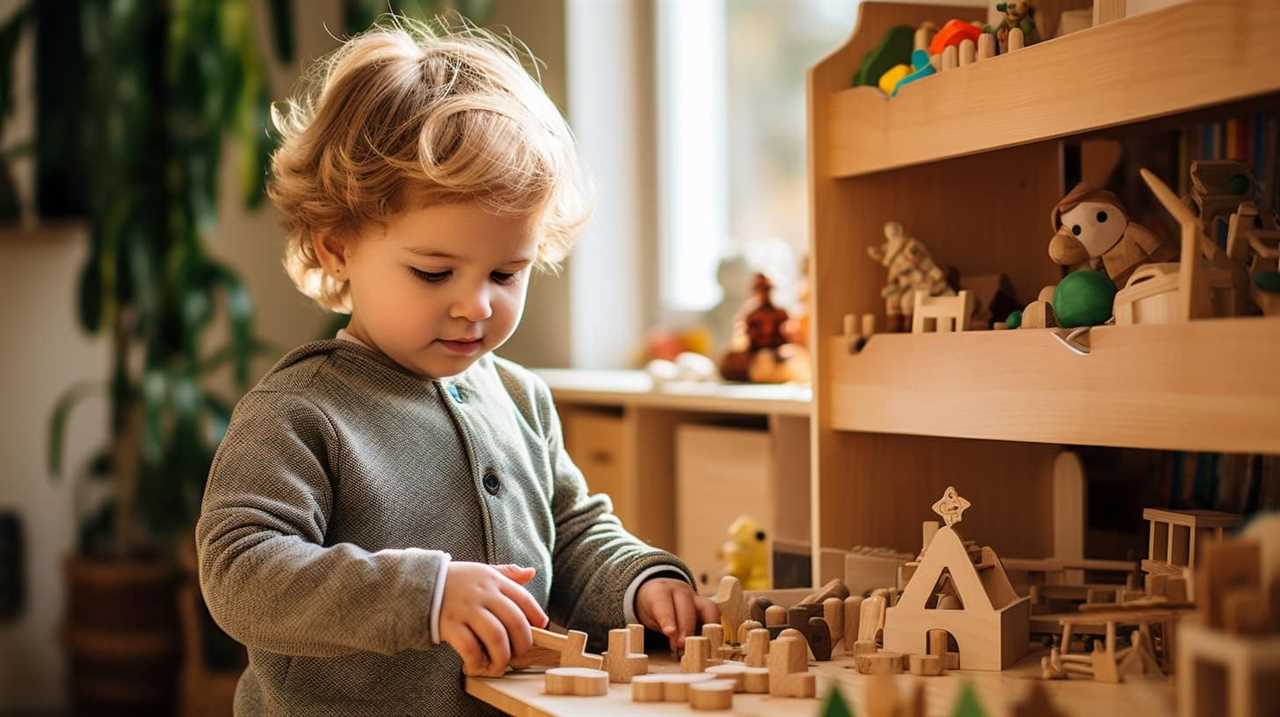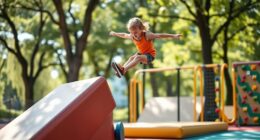Upon stepping into a Montessori classroom, the vibrant colors and inviting materials scattered around the room immediately catch my attention. The atmosphere is filled with energy, as children can be heard engaging in purposeful activities that reflect their unique interests and passions.
The Montessori approach to education empowers students through personalized learning, allowing them to take ownership of their education and thrive in an environment that respects their individuality.
In this article, we will delve into the key principles of the Montessori approach and explore how it fosters independence, enhances learning, and promotes social interaction.
Key Takeaways
- Respect for the child’s uniqueness and individual needs
- Emphasis on practical life skills and fostering independence
- Learning through the senses and making meaningful connections
- Fostering social interaction, collaboration, and emotional development
The Montessori Approach: A Unique and Personalized Education
The Montessori Approach offers a unique and personalized education that respects each child’s individual needs and interests. It is an individualized approach that focuses on personalized learning for every student.
In a Montessori classroom, students have the freedom to choose their own learning area and move freely in the classroom. This allows them to explore their interests and learn at their own pace.
The emphasis is also placed on practical life skills, such as cooking and cleaning, which helps foster independence and self-confidence in students.

Additionally, the Montessori Approach enhances learning through the use of sensory materials, engaging the child’s senses and making the learning experience more meaningful.
Overall, the Montessori Approach provides a customized education that empowers students to take ownership of their learning journey.
Empowering Students Through Individualized Learning
As an educator, I believe in tailoring learning experiences to meet the unique needs and interests of each student. One way to achieve this is through individualized instruction, which promotes student autonomy and empowers students to take ownership of their education.
In a Montessori classroom, this is exemplified by allowing students to choose their own learning area and move freely within the classroom. Additionally, emphasis is placed on practical life skills, such as cooking and cleaning, which not only foster independence but also offer opportunities for students to explore their interests and develop confidence.
Learning through sensory materials further enhances the individualized learning experience by engaging the child’s senses and making learning more meaningful. By providing hands-on learning opportunities and self-correcting materials, students are encouraged to problem-solve and learn from their mistakes, promoting a sense of autonomy and self-confidence.
Overall, individualized instruction in a Montessori setting empowers students to become independent, self-directed learners.

Personalized Education: Key Principles of the Montessori Approach
Tailoring learning experiences to meet the unique needs and interests of each student is a key principle of the Montessori approach. Personalized learning benefits both the student and the effectiveness of the Montessori approach.
By recognizing and supporting each child’s individuality, we empower them to take ownership of their education and develop a love for learning. Through personalized education, students can learn at their own pace and explore areas of interest that motivate them. This approach allows for a more comprehensive understanding of concepts and encourages deeper engagement with the materials.
The Montessori approach’s effectiveness lies in its ability to foster independence, self-confidence, and a sense of accomplishment in students. By tailoring the learning experience to each student, we create an environment that nurtures their growth and prepares them for future success.
Fostering Independence and Self-Confidence in Montessori Students
Fostering independence and self-confidence in my students is a priority in the classroom. It is crucial for their development and overall well-being. By promoting autonomy, I aim to empower my students to take ownership of their learning journey.
Here are five ways I foster independence and promote self-esteem in my Montessori classroom:
- Allowing students to choose their own learning area and move freely within the classroom.
- Respecting each child’s uniqueness and supporting their individual needs and interests.
- Emphasizing practical life skills, such as cooking and cleaning, to develop independence and self-confidence.
- Engaging students’ senses with a wide range of materials to enhance their learning experience.
- Encouraging social interaction and collaboration to foster effective communication and teamwork.
Enhancing Learning Through Hands-On Experiences in Montessori Education
Enhancing learning through hands-on experiences allows me to create a dynamic and engaging classroom environment.

Hands-on exploration is a key component of active learning in Montessori education. By providing students with opportunities to interact directly with materials and engage their senses, they are able to deepen their understanding of concepts and make meaningful connections to the real world.
Through hands-on exploration, students are actively involved in the learning process, which promotes a deeper and more effective learning experience. This approach also empowers students to take ownership of their education and develop problem-solving skills.
The Power of Sensory Materials in Montessori Education
Using a variety of sensory materials in my classroom allows me to create a dynamic and engaging learning environment. The importance of sensory engagement in Montessori education cannot be overstated. By incorporating hands-on learning with sensory materials, students are able to explore and understand concepts in a more meaningful way.
The benefits are numerous:
- Enhanced understanding: Sensory materials appeal to the senses, making learning more tangible and relatable.
- Real-world connections: Through interaction with sensory materials, students can make connections to abstract concepts and apply their knowledge in practical ways.
- Deeper learning experience: Engaging the senses promotes a deeper and more effective learning experience.
- Development of critical skills: Interacting with sensory materials develops important skills in math, language, and science.
- Increased engagement: Sensory materials capture students’ attention and keep them actively involved in the learning process.
Overall, incorporating sensory materials in Montessori education enhances the learning experience and empowers students to become confident and capable learners.
Social Interaction and Collaboration in Montessori Classrooms
Working together with my classmates in the Montessori classroom promotes effective communication, problem-solving, and respect. Social interaction and collaboration skills are key components of the Montessori approach, as they foster important social and emotional development in students.

By creating an environment that values and encourages social interaction, students learn to engage with others, work together on projects, and participate in group activities. This emphasis on social interaction not only enhances the overall learning experience but also prepares students for future success by developing important social skills and effective interaction with others.
Collaboration in the Montessori classroom promotes effective communication, problem-solving, and teamwork, as students learn to express their ideas, listen to others, and find solutions together. Through this collaborative process, students develop a sense of responsibility, empathy, and understanding, contributing to a positive and supportive classroom community.
Benefits of Self-Correcting Materials in Montessori Education
I love how self-correcting materials in my Montessori classroom deepen my understanding of concepts and foster my autonomy and self-confidence.
The benefits of self-correcting materials in Montessori education are numerous and impactful. Here are five key advantages:
- Active Engagement: Self-correcting materials require me to actively engage with the learning process, encouraging a deeper understanding of concepts.
- Autonomy: These materials empower me to work independently, making choices and taking ownership of my education.
- Self-Confidence: As I navigate and correct my own mistakes, my self-confidence grows, knowing that I can learn and problem-solve on my own.
- Problem-Solving Skills: Self-correcting materials prompt me to analyze my mistakes and find solutions, fostering critical thinking and problem-solving skills.
- Mastery of Concepts: Through repeated practice with self-correcting materials, I can master and internalize concepts, building a solid foundation for future learning.
Frequently Asked Questions
How Does the Montessori Approach Promote the Development of Social and Emotional Skills in Students?
The Montessori approach promotes the development of social and emotional skills in students by promoting empathy and developing communication skills. It creates an environment that encourages effective communication, problem-solving, and respect, fostering teamwork, cooperation, and collaboration.
What Are Some Examples of Practical Life Skills That Students Learn in a Montessori Classroom?
In a Montessori classroom, students learn practical life skills that promote independence and self-confidence. Examples include cooking, cleaning, and self-care skills, which empower students to become competent and confident individuals.

How Does the Use of Sensory Materials Enhance the Learning Experience for Montessori Students?
Using sensory materials in Montessori education enhances learning by engaging the senses, making concepts more meaningful. It deepens understanding, promotes real-world connections, and fosters a more effective and enjoyable learning experience.
Can You Explain How the Montessori Approach Fosters Independence and Self-Confidence in Students?
The Montessori approach fosters independence and builds self-confidence in students. By allowing them to choose their learning area, learn at their own pace, and develop practical life skills, students become empowered and confident individuals.
What Are the Benefits of Hands-On Learning and Self-Correcting Materials in a Montessori Education?
Hands-on learning and self-correcting materials in a Montessori education offer numerous benefits. They deepen understanding through active engagement, foster autonomy and self-confidence, and encourage problem-solving and learning from mistakes.
Conclusion
In conclusion, the Montessori approach to education offers a unique and personalized learning experience for students. By prioritizing respect for the child and fostering independence and self-confidence, Montessori empowers students to take ownership of their education.
The emphasis on practical life skills and sensory experiences helps students develop important life skills and a deeper understanding of abstract concepts.
While some may argue that the lack of structure in a Montessori classroom may hinder academic progress, the freedom to learn at their own pace and explore their individual interests actually enhances learning and promotes problem-solving skills.

Overall, the Montessori approach provides a holistic and student-centered education that supports the individual needs and interests of each child.










